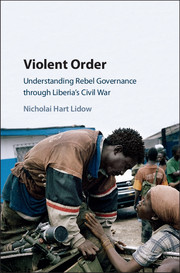Crossref Citations
This Book has been
cited by the following publications. This list is generated based on data provided by Crossref.
Berman, Eli
and
Matanock, Aila M.
2015.
The Empiricists' Insurgency.
Annual Review of Political Science,
Vol. 18,
Issue. 1,
p.
443.
Plank, Friedrich
2017.
When Peace Leads to Divorce: The Splintering of Rebel Groups in Powersharing Agreements.
Civil Wars,
Vol. 19,
Issue. 2,
p.
176.
McDougal, Topher
Hagerty, Talia
Inks, Lisa
and
Conroy, Stone
2018.
The Effect of Farmer-Pastoralist Violence on State-Level Internal Revenue Generation in Nigeria: A Modified Synthetic Control Analysis Approach.
Peace Economics, Peace Science and Public Policy,
Vol. 24,
Issue. 1,
Martínez Pérez, Guillermo
Tarr-Attia, Christine K.
Breeze-Barry, Bondey
Sarukhan, Adelaida
Lansana, Dawoh Peter
Meyer García-Sípido, Ana
Rosés, Anna
Maixenchs, María
Bassat, Quique
and
Mayor, Alfredo
2018.
‘Researchers have love for life’: opportunities and barriers to engage pregnant women in malaria research in post-Ebola Liberia.
Malaria Journal,
Vol. 17,
Issue. 1,
Perkoski, Evan
2019.
Internal Politics and the Fragmentation of Armed Groups.
International Studies Quarterly,
Vol. 63,
Issue. 4,
p.
876.
Tarr-Attia, Christine K.
Boiwu, Grace Hawa
and
Martínez-Pérez, Guillermo
2019.
‘Birds of the same feathers fly together’: midwives’ experiences with pregnant women and FGM/C complications - a grounded theory study in Liberia.
Reproductive Health,
Vol. 16,
Issue. 1,
Nagel, Robert Ulrich
and
Doctor, Austin C.
2020.
Conflict-related Sexual Violence and Rebel Group Fragmentation.
Journal of Conflict Resolution,
Vol. 64,
Issue. 7-8,
p.
1226.
Bell, Andrew M.
and
Terry, Fiona
2020.
Combatant Rank and Socialization to Norms of Restraint: Examining the Australian and Philippine Armies.
SSRN Electronic Journal,
Doctor, Austin C
2020.
A Motion of No Confidence: Leadership and Rebel Fragmentation.
Journal of Global Security Studies,
Vol. 5,
Issue. 4,
p.
598.
Stewart, Megan A
2020.
Rebel governance: military boon or military bust? (Isard Award Article).
Conflict Management and Peace Science,
Vol. 37,
Issue. 1,
p.
16.
Tominaga, Yasutaka
and
Lee, Chia-yi
2021.
When Disasters Hit Civil Wars: Natural Resource Exploitation and Rebel Group Resilience.
International Studies Quarterly,
Vol. 65,
Issue. 2,
p.
423.
Joo, Minnie M.
and
Mukherjee, Bumba
2021.
Rebel command and control, time, and rebel group splits.
International Interactions,
Vol. 47,
Issue. 2,
p.
318.
Swed, Ori
2021.
Implausible sovereigns and their organizational logic: violent non-state actors’ response to COVID-19.
Small Wars & Insurgencies,
Vol. 32,
Issue. 8,
p.
1302.
Doctor, Austin C.
2021.
Rebel Leadership and the Specialisation of Rebel Operations.
Civil Wars,
Vol. 23,
Issue. 3,
p.
311.
Bell, Andrew M.
and
Terry, Fiona
2021.
Combatant rank and socialization to norms of restraint: examining the Australian and Philippine armies.
International Interactions,
Vol. 47,
Issue. 5,
p.
825.
Balcells, Laia
and
Stanton, Jessica A.
2021.
Violence Against Civilians During Armed Conflict: Moving Beyond the Macro- and Micro-Level Divide.
Annual Review of Political Science,
Vol. 24,
Issue. 1,
p.
45.
Cunningham, Kathleen Gallagher
and
Loyle, Cyanne E.
2021.
Introduction to the Special Feature on Dynamic Processes of Rebel Governance.
Journal of Conflict Resolution,
Vol. 65,
Issue. 1,
p.
3.
Lombard, Louisa
and
Picco, Enrica
2021.
Distributive Justice at War: Displacement and Its Afterlives in the Central African Republic.
Journal of Refugee Studies,
Vol. 34,
Issue. 1,
p.
806.
van Baalen, Sebastian
2021.
Local elites, civil resistance, and the responsiveness of rebel governance in Côte d’Ivoire.
Journal of Peace Research,
Vol. 58,
Issue. 5,
p.
930.
Voyvodic, Clara
2021.
The legacy of rebel order: local (in)security in Colombia.
Conflict, Security & Development,
Vol. 21,
Issue. 2,
p.
177.



